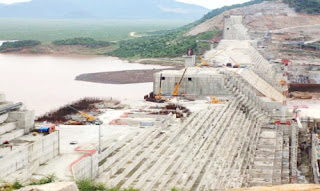Ethiopia to start filling GERD during current heavy rain season: PM
Ethiopian Prime Minister Abiy Ahmed said that his country will start filling the reservoir of the Grand Ethiopian Renaissance Dam (GERD) to tap into the current heavy rain season, despite Egypt and Sudan earlier saying that the three countries had agreed to delay the filling until a trilateral agreement on the disputed project is reached.
According to Al-Arabiya news website, Abiy said that disagreements between his country and Egypt over the giant hydropower project on the Blue Nile will be resolved within the African Union (AU), which is currently mediating ongoing talks on a potential agreement.
"Ethiopia will not harm Egypt and will start filling the dam to tap into the [current] heavy rain season. We will not deprive Egypt of water and will reach an agreement soon," the Ethiopian premier was quoted by Al-Arabiya as saying on Tuesday.
Over the past few days, Addis Ababa has witnessed large demonstrations following the murder of popular singer Hachalu Hundessa, who was shot dead by unknown attackers in the country's capital last week. The unrest has left dozens dead, injured and arrested.
The prime minister said that recent domestic unrest would not derail his plan to start filling the dam
"The desire of the breaking news is to make the Ethiopian government take its eye off the dam," Abiy was quoted as saying by AFP during a question-and-answer session with lawmakers on Tuesday, without giving evidence to support the claim.
"If Ethiopia doesn't fill the dam, it means Ethiopia has agreed to demolish the dam," he said.
"On other points we can reach an agreement slowly over time, but for the filling of the dam we can reach and sign an agreement this year," he added.
Ethiopia had repeatedly said it would begin filling the dam in July regardless of whether an agreement is reached with the downstream countries.
Both Egypt and Sudan said late last month that the three nations had agreed during the new round of negotiations to delay the filling of the dam's reservoir until an accord is reached. But Ethiopia undermined the announcement by the two downstream countries, saying shortly after that it was on track to begin the filling within weeks.
The African Union last month called on the three nations to refrain from taking any action that may "jeopardise or complicate" its efforts to find an acceptable solution to all outstanding matters over the decade-long dispute over the $4.8 billion dam.
The AU-brokered talks come in response to a call from South Africa President Cyril Ramaphosa, the current chairperson of the AU, and is being held online in the attendance of 11 observers representing the EU, the US, the AU Commission, South Africa and the AU's legal and technical experts. They are due to end on 11 July.
Egypt said after the fourth day of the online talks that "fundamental" technical and legal differences over the dam still exist.
Egypt, which relies on the Nile for 95 percent of its freshwater, fears the dam will significantly cut the river’s flow, especially during the filling stages through periods of drought and dry years, while Ethiopia says the project is key to its development efforts.
The previous round of negotiations between the three countries, held from 9 to 17 June, failed to produce an accord due to Ethiopia's refusal to enter into a legally binding agreement and its announcement that it will begin filling the dam in July with or without the approval of the two downstream countries.
In response, Egypt appealed to the UN Security Council to intervene to resolve the stalemate to preserve international peace and stability.
The Security Council urged the three countries to avoid adopting any unilateral actions and conduct talks on the basis of mutual understanding.
Source: Ahram




Comments
Post a Comment